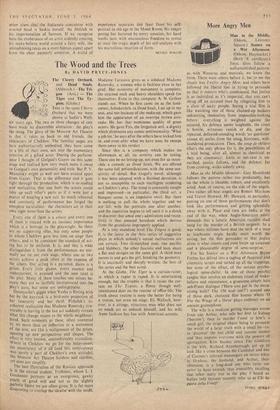The Wood and the Trees
By DAVID PRYCE-JONES
The Cherry Orchard, 0 and Dead Souls. (Ald wych.)—The Tri- Co gon. (Arts.) — The Tiger and The Ty- pists. (Globe.) rri THIS is the same Cherry 14-"AellA' Orchard that we were
shown at Sadler's Wells six years ago. The two or three changes of cast have made no discernible alteration : the play's the thing. The glory of the Moscow Art Theatre is that it takes us back to old friends, the characters of Chekhov. The familiar pages are here authoritatively embodied, they have come to a life of their own, not into the momentary creation of a gifted actor. During the perform- ance I thought of Gielgud's Gayev on this same stage and realised 'how very much more it owed to Gielgud's own personality and style. But P. V. Massalsky might as well not have existed apart from Gayev. That is the difference and it goes right through the production, which is so studied and meticulous that one feels the actors could take up each other's parts as if it were just a matter of wearing'a new suit. So much rehearsal and continuity of performance has forged the complete naturalism: the characters act in their own right more than the actors.
Every one of them is a soloist and every one of them is treated with an intrinsic importance which is a homage to the playwright. So there are no supporting roles, but only some people to whom Chekhov gave less time on stage than others, and to be consistent the standard of act- ing has to be uniform. It is, and this is what distinguishes it from the performances we nor- mally see on our own stage, where one or two actors achieve a peak often at the expense of the others. Our acting is a pyramid, theirs is a prism. Every little glance, every nuance and undercurrent, is assessed and the sum total is the play. Many of these touches one misses be- cause they are so tactfully incorporated into the Play's aura, but some are unforgettable.
Dounyasha's giggle when Yasha is flirting with her by the haystack is a bird-note projection of her insecurity and her thrill. Pishchik's in- coherent realisation that Madame Ranevsky irre- vocably is leaving in the last act suddenly reveals 14/hat this change means to the whole neighbour- hood. Such moments as these, often conveyed by no more than an inflection or a movement of the arm, are like a realignment of the prism, opening up new perspectives and shapes. The effect is very intense, uncomfortably crystalline. Where in Chekhov we go for the bitter-sweet, the uncertainty of it all (and this ambivalence was surely a part of Chekhov's own attitude), the Moscow Art Theatre hardens and clarifies, yet does not simplify. The best illustration of the Russian approach is in the eternal student, Trofimov, whom L. I. Goubanov portrays as an overgrown, gawky youth of good will and not as the slightly pathetic figure we are often given. It is far more disquieting to overlap the idealist with the misfit. Madame Tarasova gives us a subdued Madame Ranevsky, a woman who is feckless even in her grief. Her economy• of movement is complete; the strained neck and heavy shoulders speak for themselves. Even in this company A. N. Gribov stands out. When he first came on as the land- owner, Sobakevitch, in Dead Souls, I sat up in my seat, and not because of the make-up, which gave him the appearance of an overripe brown avo- cado. He has that numinous quality of great actors. He'gavc Firs, the forgotten serf, a dignity which eliminates any comic sentimentality. 'What a job lot,' he says after the others have locked him in, and even after what we have seen, he sweeps them away in his verdict.
Since this is a company which makes no allowances at all, its severity can be taxing. There can be no letting-up, not even for so osten- sible a comedy as Dead Souls. We are offered the same full personifications, with the same sen- sitivity of detail. But Gogol's novel, although it has been adapted with a finished devotion, is not so susceptible to such intelligent rendering as Chekhov's play. The mind is constantly caught and impressed—in particular, the third act, a banquet scene, is an impulsive swirl. But there is nothing to pull the whole together and we are left with the portraits one after another, and the repetition begins to tell until it is a shock to discover that amid one's admiration and recep- tivity is that amazed boredom which derives from the grandiose improperly applied.
At a tiny mundane level The Trigon is good. It is the latest in the Arts series of suggestive plays in which nobody's sexual inclinations are too certain. Two ill-matched men, one pacifist and blubbery, the other fascistic and lean, share a flat and designs on the same girl. A third man moves in and gets the girl, breaking the geometry. It is succinctly and sharply written; the best of the series and the best acted.
At the Globe, The Tiger is a curtain-raiser, in which a rapist is raped. It is entertaining enough, but the trouble is that it raises the cur- tain on The Typists, a flimsy though well- intentioned duet on the routine of office life. The truth about routine is none the better for being a truism, not even on stage. Eli Wallach, how- ever, is a stringy, vivacious man who does not so much act as unleash himself, and his wife Anne Jackson has fun with American. accents.






































 Previous page
Previous page